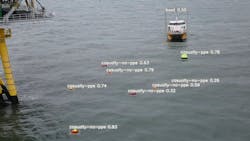Zelim teams up with US Coast Guard to trial AI in search and rescue
EDINBURGH, Scotland, UK – The US Coast Guard Research and Development Center has signed a Cooperative Research and Development Agreement (CRADA) with Zelim, a start-up based in Edinburgh, Scotland, to jointly explore the potential application and effectiveness of AI-enabled detection and tracking technology in search and rescue.
Over the last three years, Zelim has been developing ZOE, a solution that employs AI to detect and track multiple people, boats or target objects in the water by day or night, storm, or fog. Like the driving aids that reduce driver fatigue, provide hazard alerts and timely information in cars, ZOE aids the search operator by consistently scanning the searched area looking for anomalies and providing visual and audible alerts.
The US Coast Guard has identified in its Strategic Plan that rapidly advancing technologies, including those in artificial intelligence, and machine learning need to be harnessed for possible use in mission execution. The ability to detect, locate, characterize, identify, and track people or objects in the water in near or real-time has the potential to improve mission support to meet the needs of the Coast Guard today and in the foreseeable future.
The overarching objective of the CRADA is to determine methods to evaluate the effectiveness of AI technology with unclassified optical sensors in various environmental conditions. This will require the Coast Guard and Zelim to scientifically develop an objective method for determining AI technology effectiveness compared to current accepted standards.
Doug Lothian CTO of Zelim said: “We have developed ZOE as a tool to support search and rescue units, making it easier for them to spot and track multiple people and boats in the water, whatever the conditions. We are extremely proud to be partnering with the US Coast Guard, who operate the world’s largest SAR fleet. Bringing their operational experience into the project is vital to making sure the technology meets the needs of SAR operators now and in the future.”
09.28.203
